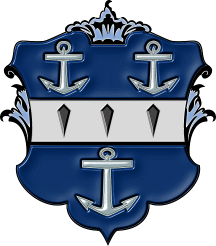Cory D. Boatright, PhD
I have a Prusa i3 Mk3 printer. More about what other printers I have/had, what software I use, basic accomplishments, etc. to come later.
I should point out here that there is some negativity expressed towards the administration of a school. That administration has completely turned over since my time at that location and my feelings towards the administration of the past do not reflect upon the current operations of that institution. This page is purely an expression of my own experiences and how I became what I am from an academic viewpoint.
High School
I graduated from Groveport Madison High School in the Columbus, Ohio area in 2004. My entire K-12 experience was at that district and it doesn't have the greatest reputation, mostly due to funding issues. Speaking for myself, the school district wasn't all that bad. I believe, looking back, that the district's administration did a good job of confining the impacts of the low funding to the facilities and other, more manageable, areas. The high school football "stadium" was awful when I was there. The school buildings were showing their age. Our textbooks, depending on the class, were old. Given the topics and material covered in primary education, I still don't understand the handwringing over textbook age. The teachers were, for the most part, excellent and that is what was most important.
When I tried to defend my district to the elitists of other districts, they would claim I wasn't suffering the negative effects because I was smarter and could fill in the gaps. That's not true; the internet wasn't as convenient to self-education (or I didn't use it as effectively for it) when I was in high school. I give the credit to the teachers.
Undergraduate
From high school I went to Hiram College for undergrad and earned my B.A. in Computer Science. The CS department had four professors my freshman year and I attended the school because my father found some list stating that Hiram was highly ranked for undergraduate computer science. During my freshmen year the administration brilliantly decided to sabotage the department and downsized it to two professors. Oberta "Obie" Slotterbeck and Ellen Walker managed to pull off a 3-year sustained miracle of giving me a solid education in the field on their own. I will say, however, that I felt the impacts on this one. I had to take classes out of order; after my introduction to programming class in Java I had to take Parallel Computing and Artificial Intelligence without a Data Structures class. On this, I assure you, being "smarter than average" and self-determination was a huge factor.
I graduated in 2008 and still have mixed feelings about the college because those who influenced me the most were in spite of the administration rather than a result of them. In fact the professor who put the idea of getting a PhD into my head was fired (or so I heard) for being "incompatible" after my sophomore year. In truth, Costel Ionita just had high expectations that were achievable but the complaints of weak students were louder than reason. If you are a math major and "don't remember much about integrals because Calc II was 2 years ago" you deserved to be dressed down a bit.
Graduate School
After Hiram College a third miracle occurred and I was accepted to The University of Pennsylvania and advised by Norman I. Badler for my PhD. How did I decide on UPenn? Tenured professors at the other graduate schools I visited told me that if I had the opportunity to study under Norm Badler at UPenn there was no reason to consider their own programs. These were respected institutions of their own, but they were willing to give me selfless advice. I had never heard of anything like it!
I earned my M.S.E. in Computer and Information Science (UPenn's trendy name for CS) in 2010 and my PhD in 2015. It was a slog, but I succeeded. I don't know if that would have been possible without Norm's style of advising. I hope extreme self-doubt is commonplace amongst PhD candidates, because it certainly was for me but he helped me through it. I truly cannot thank Norm enough for his patience and understanding. I missed paper deadlines for the most bizarre family emergencies and he completely understood. When I was diagnosed with ADHD at 26 years old and living my own personal hell, Norm was reassuring. Let me be clear, I felt like some sort of failure for having ADHD but disclosed it to my advisor because I thought he had the right to know, and Norm (without me asking for it) helped me to acceptance about it.
So there you have it, academic rags to riches. Self-determination, divine intervention, and a cast of extremely dedicated individuals.
I have some fairly inexpensive starter equipment for amateur astronomy. I have a Celestron NexStar 130 SLT telescope and a cheap Celestron astrophotography camera. It's basically a very cheap webcam that happens to fit in the focuser. I have acquired glass blanks to start grinding a much bigger objective mirror and try to build a better rig but like most of my hobbies, it's an "eventually" sort of thing.
This hobby has really expanded to encompass all sorts of handicraft activities. I have a woodworking shop with decent starter-equipment and have made a few medium-sized things like an entryway table. When the time came for me to be an uncle, I made a changing table/dresser for my expected uncle. The drawers have some flaws because I had to slightly modify the design and so the fronts of the drawers aren't wide enough to completely conceal the tracks. They work, they're just ugly. The changing table is also indestructible. I heard it took 3 fit enlisted Army soldiers to get it up a flight of stairs, and they had a terrible time of it!
Other things along these lines:
- Model rocket building
- Aluminum forging: using a refit Webber grill
- Candle making
- Newtonian telescope mirror grinding
- Bookbinding


Coat of Arms
The coat of arms that I use as a website logo (and have a custom wax seal for!) is from genealogical research done by George Boatwright. I commissioned an undergraduate at the University of Pennsylvania to recreate the coat of arms in a vector graphics format based on an image found in an old book. According to historical sources tracked down by George, the coat of arms was given by Henry VI to John Botwright (very old spelling of my last name) long, long ago. John Boatwright was a member of the clergy and evidently a friend of the king, possibly even helping design his own coat of arms. In a move that I feel solidly confirms my heritage to this man, John Botwright included the anchors to be a smartass; he was just making fun of his own last name. The smartass gene runs strong in my family to this day. I have also read that he was known to always keep a small black notebook with him at all times, which was hilarious when I read it as I keep notebooks with me all the time and they are often black. Finally, John was the Master of Corpus Christi College of Cambridge from 1443 to 1474.
I do not know if I am related to John Botwright but in a world where my last name is rare, I just don't care. Should there come a time my DNA is linked to him, I will scream it from the mountaintops and let Cambridge know that I am the offspring of one of their topmost officials. Until then, I'll just use the coat of arms because it's slightly more authentic than the shady things people normally pay for and only claim heritage to those I know I am related to!
Family History
Coming "soon." The short version is that my paternal family has been in America since 1653. I like to refer to it as "not being on the Mayflower, but they saw us in the rearview mirror."
Academic Family Tree
This is much more brief, though later I want to flesh out some of the side branches because there are some very interesting academic "cousins" out there. It's an academic hobby that some have to see who they are "related" to based on the chain of doctoral advisors. Here is what I have found for mine. The site that generated the tree image used blue for a doctoral advisor based on a PhD program and the green line indicates a long apprenticeship that did not result in a formal degree. What is interesting to note is that the PhD in the United States of America has not existed for a particularly long time. In fact such a doctoral degree was introduced to this country around the time of Thomas Edison. For that reason, one did not need to have a doctorate to teach at a university, which was the route taken by Arthur E. Kennelly and how he could become the dissertation advisor of Vannevar Bush, who was a science community superstar especially during WWII.

